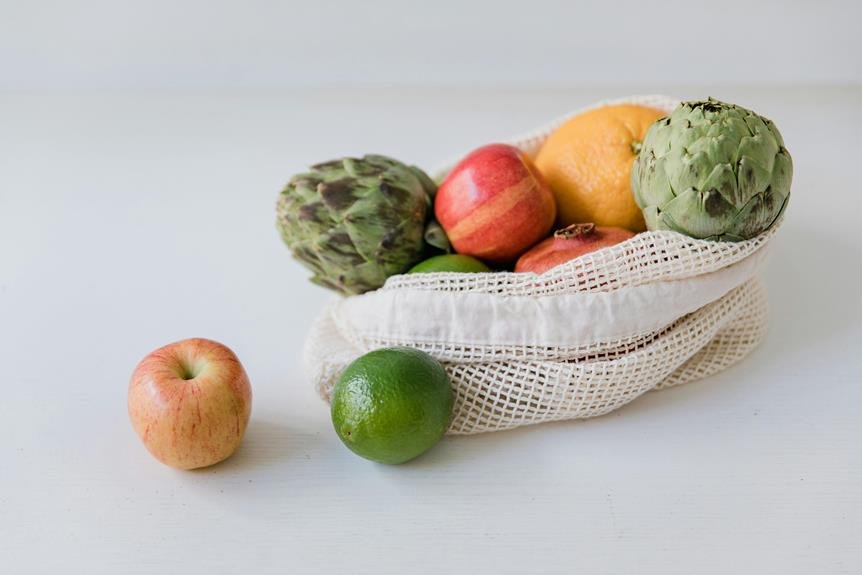
If you're a vegetarian looking to boost your fiber intake, exploring the rich variety of plant-based options available can be a game-changer for your diet. From the vibrant colors of fruits to the earthy goodness of vegetables, and the hearty satisfaction of whole grains and legumes, there's a world of fiber waiting to be discovered. But which sources stand out above the rest? Let's uncover the top contenders that can help you elevate your fiber game and support your overall health in a delicious and nutritious way.
Fruits
When looking for sources of fiber as a vegetarian, fruits are a great option to consider. Not only are they delicious and refreshing, but they also provide essential nutrients and a good amount of dietary fiber. Fruits like apples, pears, and berries are particularly high in fiber content. An apple a day not only keeps the doctor away but also helps you meet your daily fiber needs.
Berries, such as raspberries and blackberries, aren't only tasty but also pack a fiber punch that can aid in digestion and overall gut health.
Additionally, dried fruits like prunes, figs, and apricots are concentrated sources of fiber. They make for convenient snacks and can easily be incorporated into your meals. Whether you add them to your morning oatmeal or enjoy them on their own, dried fruits are a convenient way to boost your fiber intake. Remember to drink plenty of water when consuming dried fruits to help with digestion.
Vegetables
To continue exploring fiber sources for vegetarians, turn your attention to vegetables, another excellent source of dietary fiber that can complement your fruit intake. Vegetables aren't only rich in essential vitamins and minerals but also provide a significant amount of fiber crucial for maintaining a healthy digestive system. Incorporating a variety of vegetables into your diet can help you meet your daily fiber needs.
Some of the best high-fiber vegetables include broccoli, artichokes, Brussels sprouts, and sweet potatoes. These vegetables aren't only delicious but also pack a powerful fiber punch. Leafy greens such as spinach, kale, and Swiss chard are also great options for increasing your fiber intake.
To make the most of the fiber content in vegetables, try to consume them in their whole form rather than juicing or blending them. This way, you retain the maximum amount of fiber present in the skin and flesh of the vegetable. Experiment with different cooking methods like roasting, steaming, or sautéing to enhance the flavors and textures of your fiber-rich vegetable dishes.
Whole Grains
Exploring whole grains as a valuable source of fiber, consider incorporating options like quinoa, barley, and brown rice into your vegetarian diet. These whole grains aren't only rich in fiber but also provide essential nutrients like iron, magnesium, and B vitamins.
Quinoa, a complete protein, offers a nutty flavor and a satisfying crunch, making it a versatile ingredient for salads or grain bowls. Barley, with its chewy texture and nutty taste, is perfect for soups, stews, or even as a side dish. Brown rice, a staple in many cuisines, adds a hearty element to meals and can be used in stir-fries, casseroles, or as a base for veggie bowls.
To boost your fiber intake, opt for whole grain bread, pasta, and cereals. Look for labels that specify 'whole grain' as the first ingredient to ensure you're getting the maximum fiber content. Experiment with different whole grains to keep your meals interesting and nutritious. By incorporating a variety of whole grains into your vegetarian diet, you can increase your fiber intake while enjoying delicious and wholesome foods.
Legumes
Consider the versatility of legumes as a fiber-rich addition to your vegetarian diet. Legumes, such as lentils, chickpeas, black beans, and peas, pack a powerful punch when it comes to fiber content. These plant-based sources of protein aren't only nutritious but also delicious and easy to incorporate into your meals.
Including legumes in your diet can help you meet your daily fiber requirements while also providing essential nutrients like iron, folate, and potassium. Whether you enjoy them in soups, salads, stews, or even blended into dips like hummus, legumes offer a wide range of options to suit your taste preferences.
Furthermore, legumes are budget-friendly and have a long shelf life, making them a convenient choice for meal planning. By adding legumes to your diet regularly, you can improve your digestive health, increase satiety, and support overall well-being. So next time you're planning your meals, remember to include these fiber-rich legumes for a nutritious and satisfying vegetarian diet.




